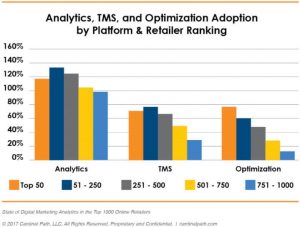 Something I got tired of doing recently was sending our weekly newsletter. Don’t get me wrong, the process of creating the newsletter is a thrill I wouldn’t miss out on: choosing the content from partners and industry experts, carefully combing through stock photos and creating imagery. Crafting the perfect copy for each section in hopes of driving our email engagement rate up…it’s fun.
Something I got tired of doing recently was sending our weekly newsletter. Don’t get me wrong, the process of creating the newsletter is a thrill I wouldn’t miss out on: choosing the content from partners and industry experts, carefully combing through stock photos and creating imagery. Crafting the perfect copy for each section in hopes of driving our email engagement rate up…it’s fun.
The part I got tired of was the design. It was responsive, it was on brand, it was great. But to me, it just seemed a little outdated, as are a lot of things I look at every day (can’t wait to get a new pair of shoes!)
So I implemented a clean, sophisticated responsive email template our agency team recently put together for a Valentine’s Day giveaway. And I sent it out on schedule without alerting subscribers to the change.
My (naïve) hope was subscribers would be wowed enough by my subject line to open the email and then be surprised out of their pants and delighted enough to click all over it.
What happened was that the newsletter saw a 2ish percent jump in open rate and a 4ish percent lift in click-to-open rate. Good enough?
That’s what I thought until a colleague asked me, “What about the rest of those people…the ones who didn’t open?”
This was a good question, so in an effort to draw in subscribers who hadn’t seen our newsletter design makeover, I performed a test.
The Good Guys
First, I sent a regular email to those on our list who had opened the week before – the good guys.
My hypothesis was I’d get high engagement from these folks because (a) they had just engaged with me the week before (b) we normally see around the same number of opens – give or take a couple hundred – with our sends over the past few months.
I’m not saying these are the same people opening over and over again. Some days people may open our email and some weeks they may not. Maybe a subscriber is traveling all day and our email gets pushed down into the bottom of the inbox where he doesn’t go looking for it. But the next week, when he’s at his desk perusing his inbox, he sees the WhatCounts Weekly pop up and takes a peek.
Whatever the reason, a good amount of our engaged subscribers are opening our newsletter regularly. So I expected nothing different when sending the newsletter to this segment of our list.
Subject line: No pain, no gain?
Preheader: Dumping inactive subscribers doesn’t have to hurt. (This refers to the blog post promoted in the hero image of the newsletter.)
- 46% higher open rate
- 2.5% higher click rate
- About the same click-to-open rate
The open rate is a major jump (yay for creative subject lines), the click rate is higher, but the click-to-open rate, (CTOR), stayed the same. And in my book, as in any email marketer’s, CTOR is where the pedal hits the metal as the true measure of engagement. So maybe these guys aren’t so good.
The Bad Guys
Now onto the so-called bad guys: those people who didn’t bite. My provocative subject line hadn’t tempted these subscribers to open and admire our fabulous new design. So I dumped them into their own special segment and sent them their own special newsletter content.
The content wasn’t that different than the good guy template. The subject line and the preheader were the only differentiators, in fact.
Subject line: Have you seen our new look?
Preheader: The WhatCounts Weekly got a makeover. Check it out!
No funny business here. It’s just down-to-business: Here it is, we have a new template. Look at it.
Did curiosity kill the cat? Maybe not, but it sure got a lot of non-openers to click yes on the newsletter.
- 4.5% open rate
- .4% click rate
- 8.7% CTOR rate
Doesn’t look impressive at first glance, but the fact 4.5 percent of subscribers opened when they hadn’t done so the week before is a win in my book. Compare this to our only 2.2 percent average open rate when we conducted a two-part re-engagement campaign last year with inactives on the same list.
And do you see that email engagement rate? An 8.7 percent click-to-open rate! This isn’t a surprise – with low open rates you typically see a much higher CTOR. Those few who are actually taking the time to open are more apt to click through, as well.
Not only were those non-openers curious enough to open the email, they liked the content inside it enough to click through.
I’m tempted to say I told you so to those non-openers who finally did open.
What Next?
I got some openers to continue opening. And I got some non-openers to open and interact with our newsletter. I have a few choices as far as next steps:
(1) Go back to sending to the entire list.
(2) Keep sending different emails to these two different lists.
(3) Take those who opened this week on the bad-guys segment and add them to the good-guys segment. Then keep sending two different emails to the two different segments.
The subject lines and preheaders would remain the only difference between the two emails. And the subject line to the non-openers wouldn’t necessarily keep pointing to our new design. Something akin to “You haven’t opened me in a while” or “Do you even care anymore?” or “Hello, anybody home?”
The last option seems most intriguing to me. It could be a re-engagement campaign of sorts.
Is this a good or bad idea? What do you think I should do next?
(274)
Report Post




